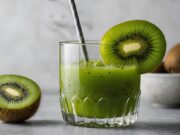
The eye, a visual organ, has the function of collecting visual information and transmitting it to the brain, so it plays a role in making it possible to see objects. These eyes are affected by various factors such as aging and genetic factors, reading for a long time, watching TV, nutritional imbalance, smoking, and prolonged exposure to harmful substances, and problems such as deterioration of vision and damage to the optic nerve occur. In particular, in recent years, the increase in the use of smartphones and various electronic devices seriously threatens eye health and is emerging as a representative risk factor that increases the incidence of various eye diseases. Therefore, it is important to improve various lifestyle habits and environmental factors that threaten eye health, and to make a habit of various management methods that help eye health and continuously implement it. In addition, it can be said that a balanced intake of ingredients that help prevent dry eyes and provide nutrients necessary for the eyes play a very important role in maintaining healthy eyes. So today, let’s take a look at the various nutrients that help maintain eye health one by one. Nutrients for eye health
1. Lutein
The first nutrient that helps a lot with eye health is lutein. Lutein, one of the carotenoids, is a component of the yellow pigment present in the retina and macula. It absorbs blue light emitted from various electronic devices, including ultraviolet rays, to protect the eyes, and at the same time increases the density of the macular pigment to improve the visual function. In addition, active oxygen generated during the metabolic process damages the macula and at the same time destroys normal cells of the eye, increasing the risk of developing eye diseases such as macular degeneration. Lutein is excellent at neutralizing excessively increased free radicals, and it is said to help protect eyesight and prevent various eye diseases. Lutein is known to be found in large amounts in green vegetables such as kale and spinach, sweet potatoes, oranges, and egg yolks.
2. Anthocyanins
Anthocyanins, a pigment mainly contained in flowers and fruits, are also essential nutrients for eye health care. It exists in the rod cells of the retina of the eye, and it improves the function of rhodopsin, which transmits light signals to the brain, and works effectively for resynthesis. In addition, anthocyanin has been recognized for its outstanding value as an excellent antioxidant, protecting the normal cells of the eye from free radicals and protecting the blood vessels of the eye, thereby having a beneficial effect on vision protection. It is said that anthocyanin is abundantly contained in various foods such as mulberry, cherry, eggplant, black bean and black rice, including berry fruits such as blueberry, aronia, and strawberry.
3. Vitamin A
Vitamin A is a fat-soluble vitamin that dissolves well in fat. It is abundant in carrots, broccoli, parsley, pumpkin, eggs, oranges, tomatoes, sweet potatoes, legumes, and dairy products. Similar to the anthocyanins introduced earlier, it plays an essential role in the production of rhodopsin, which helps us recognize objects better by sensing light. In addition, it helps the formation of a fat layer on the surface of the eyeball and protects the corneal surface and vision, which is also the main function of vitamin A. Insufficient intake of vitamin A can increase the incidence of eye diseases along with blurred vision, night blindness, and dry eye, so it is recommended to eat a variety of foods rich in vitamin A.
4. Omega 3 Fatty Acids
Omega 3 fatty acids are polyunsaturated fatty acids composed of EPA and DHA. Due to the main effect of omega-3 fatty acids, which are excellent in improving blood triglycerides and blood circulation, they have an excellent effect in improving dry eyes, and play an important role in protecting the eyes from oxidative stress caused by free radicals. In particular, omega-3 fatty acids are known to be essential nutrients for the formation and development of eyesight in fetuses and growing children. Omega 3 fatty acids are found in large amounts in mackerel, herring, sardines and other blue-green fish, as well as nuts, perilla oil, and avocados. Since it is an essential fatty acid that cannot be synthesized by itself, it must be ingested through food.
other nutrients
In addition to the various nutrients introduced above, beta-carotene is an effective nutrient for eye health care. Beta-carotene is contained in large amounts in carrots, green and yellow vegetables, seaweeds, and fruits, and has the property of a precursor that is converted to vitamin A during the body absorption process, so it helps protect eyesight and prevent various eye diseases. In addition, taurine, zinc, selenium, and B vitamins play an important role in maintaining retinal health and are known to protect eyesight by preventing oxidative damage to the eye.
































